<strong>Daily Vocabulary Words: List of Daily Used Words in Leading International Newspapers</strong>
Hi there. Welcome to this special section @ Wordpandit.
Our endeavour here is very simple: to highlight important daily vocabulary words, which you would come across in leading newspapers in the country. We have included the following newspapers in our selection:
- The New York Times
- The Washington Post
- Scientific American
- BBC
- The Guardian
- Psychology Today
- Wall Street Journal
- The Economist
We are putting in extensive work for developing your vocabulary. All you have got to do is be regular with this section and check out this post on a daily basis. This is your repository of words that are commonly used and essentially, we are posting a list of daily used words. Hence, this has significant practical application as it teaches you words that are used commonly in leading publications mentioned above.
Visit the website daily to learn words from leading international newspapers.
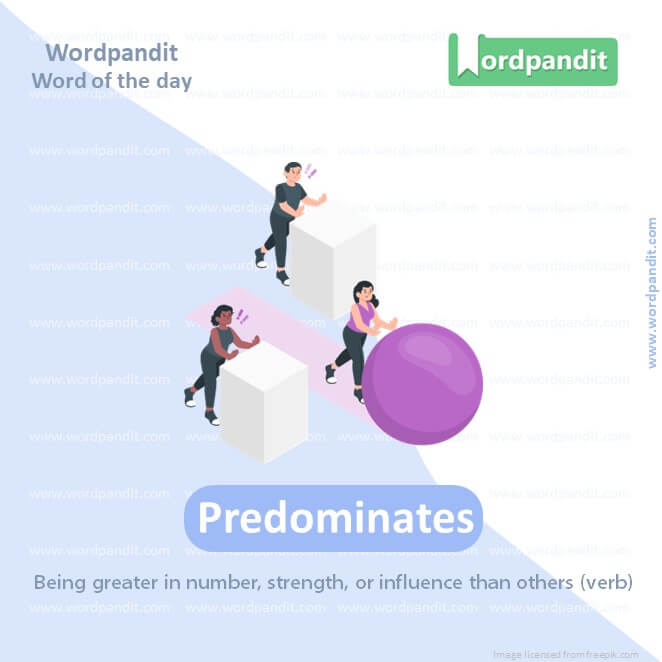
WORD-1: Predominates
CONTEXT: Zero-sum thinking predominates in collective bargaining, which by its nature pits union and management against one another.
SOURCE: Al Jazeera
EXPLANATORY PARAGRAPH: Imagine you have a bag of colorful candies. If most of the candies are blue, then blue “predominates”. It means there’s more of it than anything else!
MEANING: Being greater in number, strength, or influence than others (verb).
PRONUNCIATION: pre-DOM-in-ates
SYNONYMS: prevails, dominates, overshadows, reigns, outshines, leads, rules
USAGE EXAMPLES:
1. Blue predominates in the painting, giving it a calming feel.
2. Her passion for music predominates in her daily life.
3. In the forest, pine trees predominates over other trees.
4. The team’s defense predominates in all their matches.
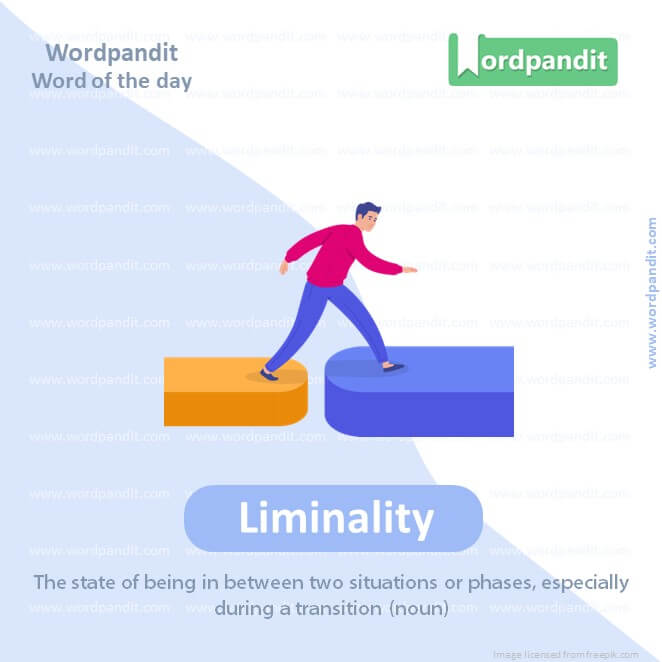
WORD-2: Liminality
CONTEXT: I revisit Brammer’s 2019 essay — and the gorgeous illustrations he drew to accompany it — every Nov. 1, a kind of liminal space between fall and the full-on holiday season. In fact, it’s full of liminality.
SOURCE: Washington Post
EXPLANATORY PARAGRAPH: “Liminality” is like being in the middle of two rooms. You’re not in the first room anymore, but you’re not quite in the next room either. It’s the feeling of being in-between.
MEANING: The state of being in between two situations or phases, especially during a transition (noun).
PRONUNCIATION: lim-in-AL-it-ee
SYNONYMS: transition, threshold, in-betweenness, crossover, midpoint, interface, crossroad
USAGE EXAMPLES:
1. Graduation is a time of liminality for students, as they leave school but haven’t started their next chapter yet.
2. The sunset provides a moment of liminality between day and night.
3. Her trip abroad was a period of liminality, as she was between two cultures.
4. Liminality often brings about personal growth.
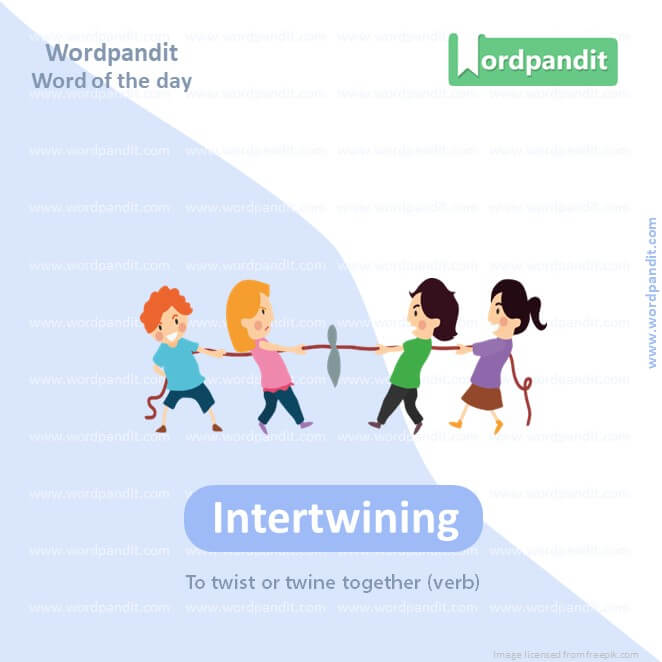
WORD-3: Intertwining
CONTEXT: Kate’s column explains the intertwining of conservative Christianity and “righteous violence” — and Christian nationalists’ retort to that pesky bit of the Bible about turning the other cheek.
SOURCE: Washington Post
EXPLANATORY PARAGRAPH: Think of “intertwining” like braiding hair. When you braid, you twist and turn different strands together. That’s what intertwining is – things getting mixed or twisted together.
MEANING: To twist or twine together (verb).
PRONUNCIATION: in-ter-TWINE-ing
SYNONYMS: interlacing, entwining, weaving, mingling, braiding, intermixing, merging
USAGE EXAMPLES:
1. Their fingers were intertwining as they held hands.
2. The two stories are intertwining in the novel.
3. The rivers are intertwining at the delta.
4. Different cultures are intertwining in big cities.
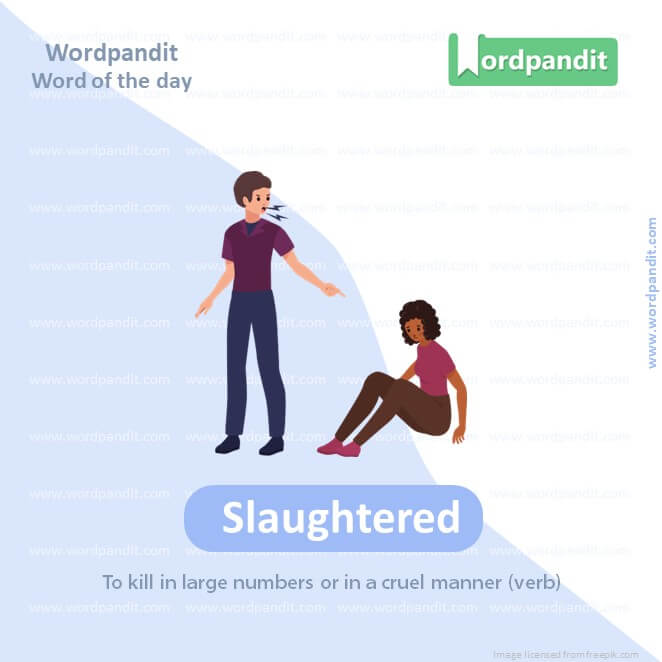
WORD-4: Slaughtered
CONTEXT: But he hadn’t understood the depth of the group’s depravity until he watched the glee in terrorists’ eyes as they slaughtered Israeli civilians, captured in a 46-minute video the Israeli Embassy screened this week for journalists.
SOURCE: Guardian
EXPLANATORY PARAGRAPH: “Slaughtered” is a strong word. It means to kill in a very harsh way, like how some animals are killed for food.
MEANING: To kill in large numbers or in a cruel manner (verb).
PRONUNCIATION: SLAW-terd
SYNONYMS: massacred, annihilated, exterminated, butchered, eliminated, wiped out, eradicated
USAGE EXAMPLES:
1. The warriors slaughtered their enemies in the battle.
2. Many animals are slaughtered for their meat.
3. The team was slaughtered in the final match.
4. He slaughtered the competition with his skills.
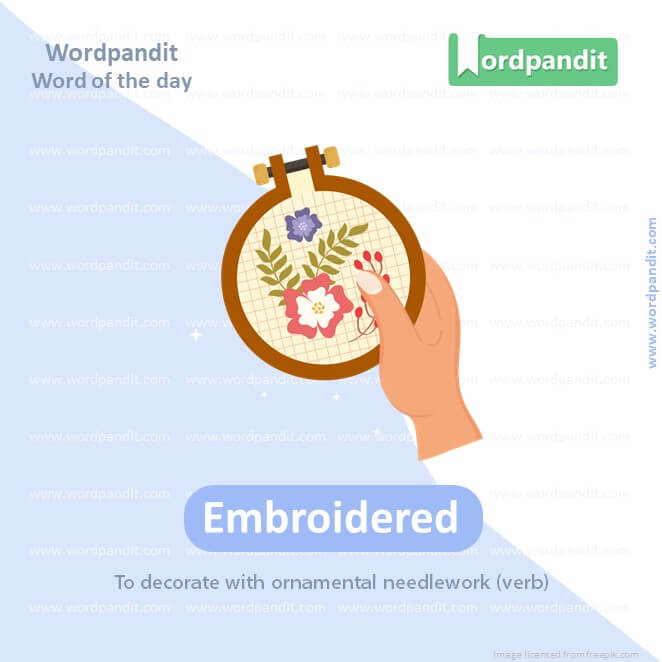
WORD-5: Embroidered
CONTEXT: Last summer while I visited Gaza, Um Said kindly gave me an embroidered dress that she once wore.
SOURCE: New York Times
EXPLANATORY PARAGRAPH: “Embroidered” means to decorate something, like cloth, by sewing patterns or pictures onto it. It’s like drawing, but with threads and needles!
MEANING: To decorate with ornamental needlework (verb).
PRONUNCIATION: em-BROY-derd
SYNONYMS: adorned, stitched, decorated, embellished, bedecked, garnished, festooned
USAGE EXAMPLES:
1. The pillow was embroidered with beautiful flowers.
2. Her dress had embroidered details on the sleeves.
3. Grandma embroidered my name on my blanket.
4. Traditional dresses are often embroidered with gold.
WORD-6: Dehumanisation
CONTEXT: Israel talks of Hamas-run schools and Hamas-run hospitals to continue the dehumanisation of Palestinians and to set the stage for more crimes.
SOURCE: New York Times
EXPLANATORY PARAGRAPH: “Dehumanisation” is when someone is treated like they’re not a real person. It’s like saying they don’t have feelings or don’t matter. It’s not a nice thing.
MEANING: The act of depriving a person of human qualities or rights (noun).
PRONUNCIATION: de-hu-man-i-ZAY-shun
SYNONYMS: belittlement, degradation, objectification, devaluation, depersonalization, alienation, desensitization
USAGE EXAMPLES:
1. Bullying leads to the dehumanisation of the victim.
2. Slavery was a period of extreme dehumanisation.
3. The movie depicted the dehumanisation of prisoners during war.
4. Dehumanisation is a harmful way to treat anyone.
WORD-7: Starvation
CONTEXT: Israel has also put the Strip under a total siege, preventing the entry of water, food, fuel, electricity or medical supplies, and leaving more than two million people faced with death by starvation, dehydration and disease.
SOURCE: Al Jazeera
EXPLANATORY PARAGRAPH: “Starvation” is when someone doesn’t get enough food to eat for a very long time. It’s when someone is very, very hungry and it’s not good for their health.
MEANING: The state of suffering or death caused by lack of food (noun).
PRONUNCIATION: star-VAY-shun
SYNONYMS: famine, hunger, malnourishment, undernourishment, malnutrition, food deprivation, emaciation
USAGE EXAMPLES:
1. Many people faced starvation during the drought.
2. The child’s eyes revealed the pain of starvation.
3. Aid agencies are working to combat starvation in the region.
4. Starvation can lead to serious health issues.
WORD-8: Apartheid
CONTEXT: amounting to crimes against humanity or war crimes, including collective punishments and the imposition of an “apartheid”.
SOURCE: Guardian
EXPLANATORY PARAGRAPH: “Apartheid” is a word from South Africa. It was a time when people were separated and treated differently based on the color of their skin. It wasn’t fair, and many people didn’t like it.
MEANING: A policy or system of segregation or discrimination on grounds of race (noun).
PRONUNCIATION: uh-PART-hyde
SYNONYMS: segregation, racial separation, discrimination, racism, prejudice, bias, bigotry
USAGE EXAMPLES:
1. Nelson Mandela fought against apartheid in South Africa.
2. Apartheid was abolished in the 1990s, but its effects are still felt.
3. Many countries condemned South Africa for its apartheid policies.
4. The museum showcases the struggles faced during the apartheid era.
WORD-9: Recurrence
CONTEXT: The roots of the R2P doctrine can be traced back to the international reaction to the recurrence of mass atrocities in conflicts in Bosnia, Rwanda and elsewhere in the 1990s.
SOURCE: Guardian
EXPLANATORY PARAGRAPH: “Recurrence” is when something happens again. It’s like watching your favorite movie many times because you like it so much.
MEANING: The act of happening or appearing again (noun).
PRONUNCIATION: ree-KUR-ens
SYNONYMS: repetition, return, comeback, reemergence, reappearance, revival, repeat
USAGE EXAMPLES:
1. The doctor was concerned about the recurrence of her symptoms.
2. Floods have a high recurrence in this region.
3. To avoid the recurrence of the issue, they installed a new system.
4. The festival sees the recurrence of many traditional dances.
WORD-10: Proliferation
CONTEXT: the proliferation of such crimes, even in the heart of Europe, rang alarm bells in the “never again” camp.
SOURCE: Al Jazeera
EXPLANATORY PARAGRAPH: “Proliferation” means when something grows or increases a lot and very quickly. Like when you see many flowers bloom in spring.
MEANING: A rapid increase in numbers or spread (noun).
PRONUNCIATION: pro-lif-er-A-shun
SYNONYMS: growth, expansion, multiplication, spread, surge, increase, boom
USAGE EXAMPLES:
1. There has been a proliferation of cell phones in recent years.
2. The proliferation of weeds in the garden is troubling.
3. The internet led to the proliferation of information.
4. The city is concerned about the proliferation of fast-food outlets.
vocabulary classes
In today’s multicultural world, knowledge is your greatest asset. And in this pool of knowledge, one arena that often goes underestimated is ‘vocabulary classes’. Most people limit the concept of vocabulary to knowing a few fancy words. However, it is much more; it’s about giving you the key to express your thoughts, feelings, and ideas more effectively.
Firstly, let’s examine why vocabulary classes are essential. When you take vocabulary classes, you’re essentially equipping your linguistic arsenal with words that allow you to articulate your messages more accurately. A well-developed vocabulary means not only knowing a multitude of words but also being able to utilize them in the appropriate context, thus enhancing your communication skills.
Now, how should we approach learning in vocabulary classes? The process of expanding your vocabulary should not be stressful. The best approach is to incorporate playfulness, curiosity, and active engagement. Incorporate reading, writing, listening, and speaking activities that are sourced from various contexts – books, movies, podcasts, discussions, and debates.
One important principle to remember when taking vocabulary classes is repetition. Repeated use of new words in different contexts will reinforce their meaning and solidify them in your memory, reducing the chance for forgetfulness.
Moreover, let’s not forget the role of technology in vocabulary classes. There’s a variety of applications and online platforms that have revolutionized the way we learn new words. They offer interactive classes, quizzes, games, and other engaging resources that make the learning process fun and effective.
In summary, vocabulary classes serve as a potent tool for enhancing your communication skills, and expressing your ideas confidently and clearly. Whether you are a business professional, student or just looking to improve your language abilities, vocabulary classes are amongst the best investments you could make. You not only learn new words but get the confidence and tools to wield them effectively.











